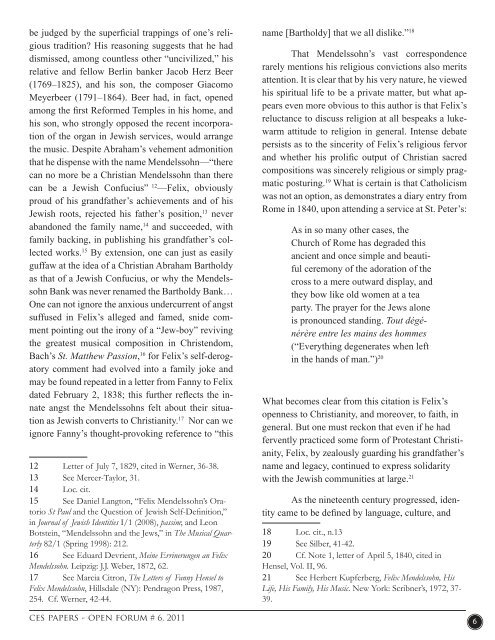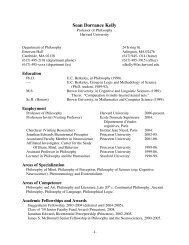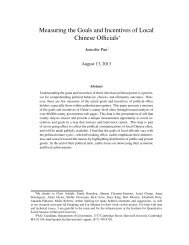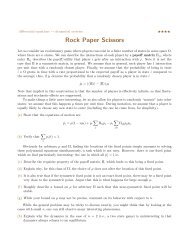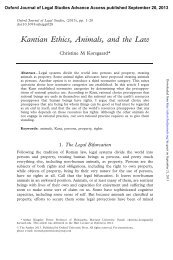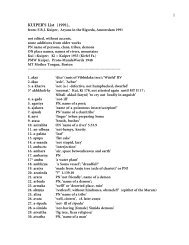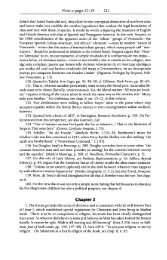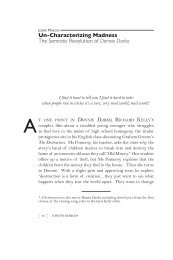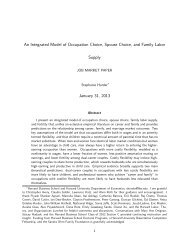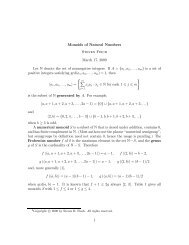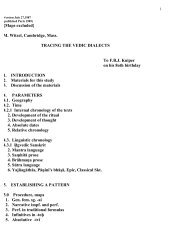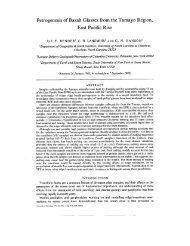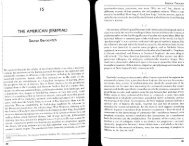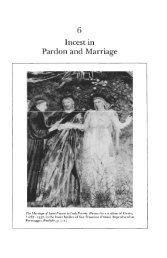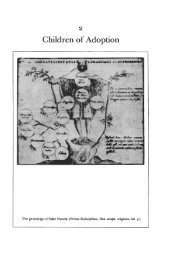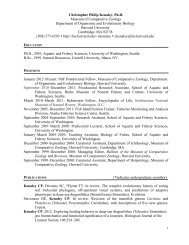references - people.fas.harvard.edu - Harvard University
references - people.fas.harvard.edu - Harvard University
references - people.fas.harvard.edu - Harvard University
Create successful ePaper yourself
Turn your PDF publications into a flip-book with our unique Google optimized e-Paper software.
e judged by the superfi cial trappings of one’s religious<br />
tradition? His reasoning suggests that he had<br />
dismissed, among countless other “uncivilized,” his<br />
relative and fellow Berlin banker Jacob Herz Beer<br />
(1769–1825), and his son, the composer Giacomo<br />
Meyerbeer (1791–1864). Beer had, in fact, opened<br />
among the fi rst Reformed Temples in his home, and<br />
his son, who strongly opposed the recent incorporation<br />
of the organ in Jewish services, would arrange<br />
the music. Despite Abraham’s vehement admonition<br />
that he dispense with the name Mendelssohn—“there<br />
can no more be a Christian Mendelssohn than there<br />
can be a Jewish Confucius” 12 —Felix, obviously<br />
proud of his grandfather’s achievements and of his<br />
Jewish roots, rejected his father’s position, 13 never<br />
abandoned the family name, 14 and succeeded, with<br />
family backing, in publishing his grandfather’s collected<br />
works. 15 By extension, one can just as easily<br />
guffaw at the idea of a Christian Abraham Bartholdy<br />
as that of a Jewish Confucius, or why the Mendelssohn<br />
Bank was never renamed the Bartholdy Bank…<br />
One can not ignore the anxious undercurrent of angst<br />
suffused in Felix’s alleged and famed, snide comment<br />
pointing out the irony of a “Jew-boy” reviving<br />
the greatest musical composition in Christendom,<br />
Bach’s St. Matthew Passion, 16 for Felix’s self-derogatory<br />
comment had evolved into a family joke and<br />
may be found repeated in a letter from Fanny to Felix<br />
dated February 2, 1838; this further refl ects the innate<br />
angst the Mendelssohns felt about their situation<br />
as Jewish converts to Christianity. 17 Nor can we<br />
ignore Fanny’s thought-provoking reference to “this<br />
12 Letter of July 7, 1829, cited in Werner, 36-38.<br />
13 See Mercer-Taylor, 31.<br />
14 Loc. cit.<br />
15 See Daniel Langton, “Felix Mendelssohn’s Oratorio<br />
St Paul and the Question of Jewish Self-Defi nition,”<br />
in Journal of Jewish Identities I/1 (2008), passim; and Leon<br />
Botstein, “Mendelssohn and the Jews,” in The Musical Quarterly<br />
82/1 (Spring 1998): 212.<br />
16 See Eduard Devrient, Meine Errinerungen an Felix<br />
Mendelssohn. Leipzig: J.J. Weber, 1872, 62.<br />
17 See Marcia Citron, The Letters of Fanny Hensel to<br />
Felix Mendelssohn, Hillsdale (NY): Pendragon Press, 1987,<br />
254. Cf. Werner, 42-44.<br />
ces papers - open forum # 6, 2011<br />
name [Bartholdy] that we all dislike.” 18<br />
That Mendelssohn’s vast correspondence<br />
rarely mentions his religious convictions also merits<br />
attention. It is clear that by his very nature, he viewed<br />
his spiritual life to be a private matter, but what appears<br />
even more obvious to this author is that Felix’s<br />
reluctance to discuss religion at all bespeaks a lukewarm<br />
attitude to religion in general. Intense debate<br />
persists as to the sincerity of Felix’s religious fervor<br />
and whether his prolifi c output of Christian sacred<br />
compositions was sincerely religious or simply pragmatic<br />
posturing. 19 What is certain is that Catholicism<br />
was not an option, as demonstrates a diary entry from<br />
Rome in 1840, upon attending a service at St. Peter’s:<br />
As in so many other cases, the<br />
Church of Rome has degraded this<br />
ancient and once simple and beautiful<br />
ceremony of the adoration of the<br />
cross to a mere outward display, and<br />
they bow like old women at a tea<br />
party. The prayer for the Jews alone<br />
is pronounced standing. Tout dégénérère<br />
entre les mains des hommes<br />
(“Everything degenerates when left<br />
in the hands of man.”) 20<br />
What becomes clear from this citation is Felix’s<br />
openness to Christianity, and moreover, to faith, in<br />
general. But one must reckon that even if he had<br />
fervently practiced some form of Protestant Christianity,<br />
Felix, by zealously guarding his grandfather’s<br />
name and legacy, continued to express solidarity<br />
with the Jewish communities at large. 21<br />
As the nineteenth century progressed, identity<br />
came to be defi ned by language, culture, and<br />
18 Loc. cit., n.13<br />
19 See Silber, 41-42.<br />
20 Cf. Note 1, letter of April 5, 1840, cited in<br />
Hensel, Vol. II, 96.<br />
21 See Herbert Kupferberg, Felix Mendelssohn, His<br />
Life, His Family, His Music. New York: Scribner’s, 1972, 37-<br />
39.<br />
6


